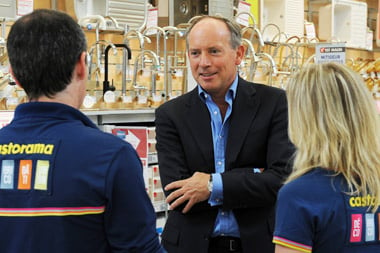Bosses: "Hike minimum wage in step with economic growth"

Kingfisher chief Sir Ian Cheshire among captains of industry asking government to increase the wages of Britain’s lowest-paid workers
Jermaine Haughton
Chief executives from some of the biggest companies operating in the UK have signed a letter calling for the minimum wage to be increased, in line with a growing economy. The signatories – including Kingfisher chief executive Sir Ian Cheshire, Hewlett Packard Enterprise Services’ managing director Craig Wilson, Balfour Beatty executive chairman Steve Marshall and B&B Investment Partners founder Chris Britton – want the government to help workers who are being squeezed by rising food and utility costs.
Since its introduction in 1998 by Tony Blair’s Labour administration, the minimum wage has become an accepted part of the working world. At present, the rate is £6.31 per hour for workers aged 21 years and older, and £5.03 per hour for workers aged between 18 and 20.
However, a recent report from think tank Resolution Foundation found that many workers were barely earning more than the minimum wage and, even then, failing to gain pay rises from that plateau. With inflation high and household costs an increasing challenge, bosses believe that it’s time the government provided greater help to the employed. Around 3.6 million people are believed to earn more than minimum wage – but below the “living wage” of £7.45 an hour (or £8.55 an hour in London) needed for a basic standard of living, the think tank said.
As real wages continue to be weak, the business leaders’ letter – published yesterday – states: “We also share concerns that the value of the minimum wage has fallen in recent years. Over the last 15 years, the national minimum wage has been successful in boosting pay at the bottom of society without leading to a loss of jobs. For businesses, it has created a level playing field, enabling employers to improve business performance and staff conditions without fear of being undercut by companies competing on lower wage rates.”
It added: “The Low Pay Commission (LPC) was right to be cautious during the economic downturn. Now, as the economy recovers, we believe the minimum wage should rise faster than it has in the recent past. A stronger minimum wage will benefit businesses, improve public finances, and help tackle low pay. The economy is growing again. But we must ensure that all employees are benefiting from the recovery – especially the lowest paid in society who find it hardest to make ends meet.”
Co-signed by former KPMG deputy chairman Alan Buckle and former LPC chair Sir George Bain, the letter marks significant, and perhaps unexpected, efforts from the private sector to boost the pay of those on low incomes. It is likely that they are hoping to influence chancellor George Osborne, who has already hinted that the minimum wage could rise from £6.31 per hour to £7.
Labour leader Ed Miliband – who appointed Buckle to examine the future of the minimum wage – believes the pay rate may have to rise faster than inflation if all employees are to benefit from the recovery. Meanwhile, Bain, who chaired the low pay commission when the minimum wage was introduced, says the system needs to be re-examined as it no longer solves the problems faced by Britain’s lowest paid workers.
“The minimum wage has been a clear success,” he said, “but the world has changed in the 15 years since it was introduced. We now know the policy has not caused unemployment, and there is broad political support. But with more than one in five workers in Britain suffering from low pay, it’s time to talk about how we strengthen the minimum wage for the years ahead.”
Proposals raised to make the minimum wage more suitable to the current socio-economic challenges include encouraging the government to set explicit targets to reduce the proportion of workers who are low paid. Bain argued: “Reform of the minimum wage will be hard to get right – it would be easy to damage a policy that works well. But our discussions suggest there are ways to take a more assertive and ambitious approach while still keeping the flexibility of the current system.”
On a positive note, optimism regarding the state of the UK economy has been steadily rising. The International Monetary Fund says the UK economy will be the fastest-growing in the G7 this year, expanding by 2.9% in 2014 and 2.5% in 2015. And in a further illustration of the job market’s continued strength, the International Labour Organisation has credited the UK for keeping unemployment to its lowest level in six years, with the jobless rate sinking by 0.2% to 6.2% in the three months to July this year.
Read more about the minimum wage and living wage in this CMI blog from earlier this year.
Photo of Sir Ian Cheshire courtesy of the Kingfisher image library.

Press & Media Enquiries
For more information or to request interviews, contact CMI's Press Team on 020 7421 2705 or email press.office@managers.org.uk


